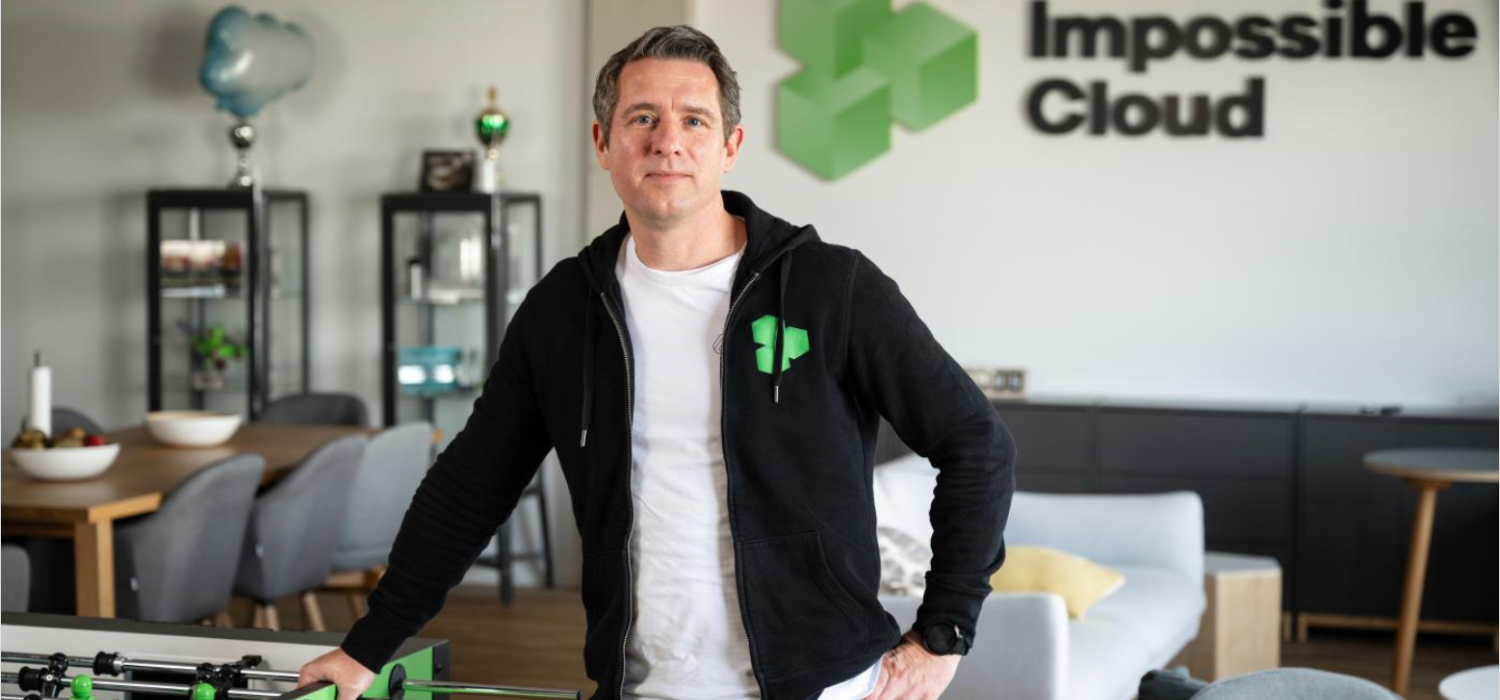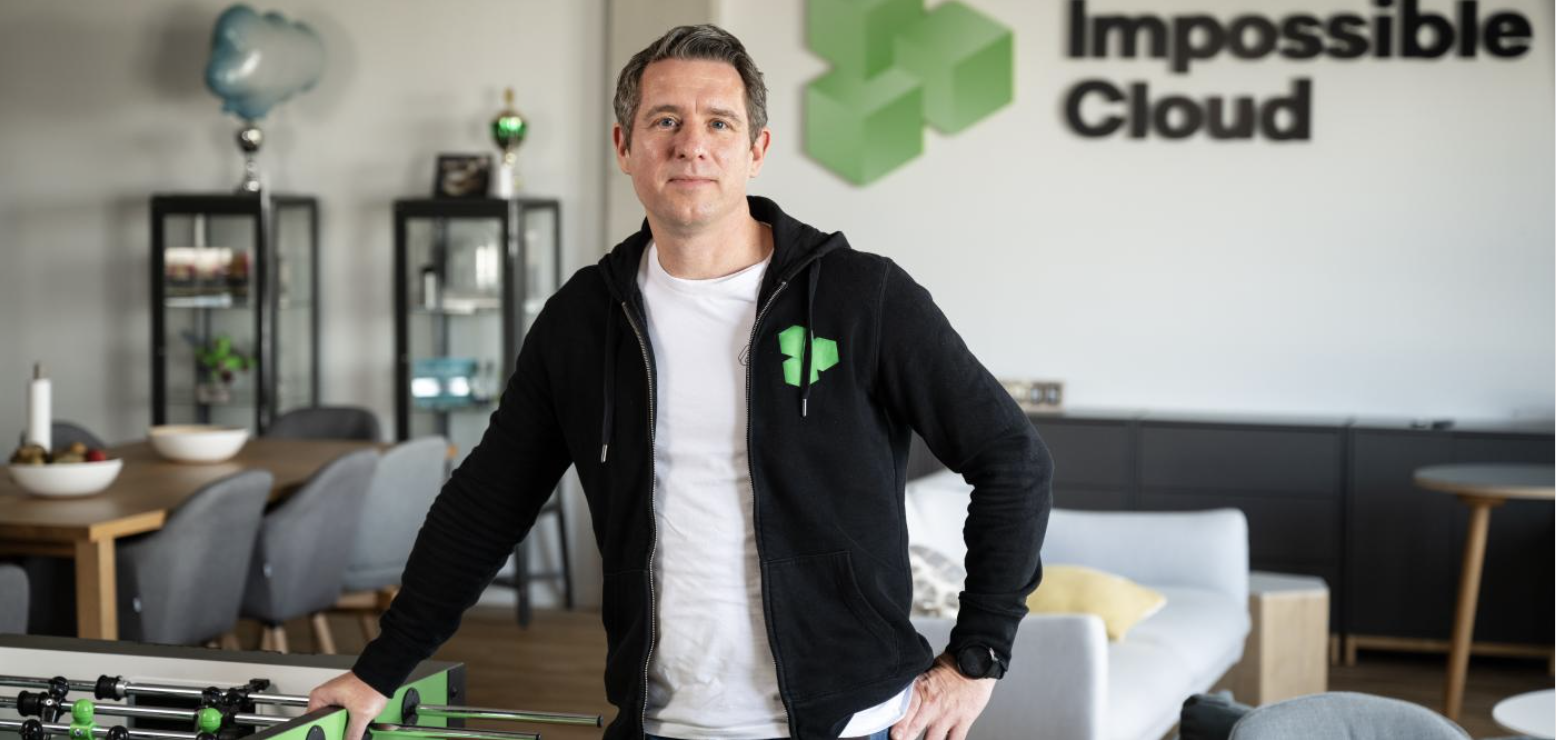
.png)
.png)
.png)
.png)



.webp)
.webp)
.webp)
.webp)
Kai was interview by Jörn Lauterbach, Editor-in-Chief, Welt am Sonntag. Read the original article in German at the WAMS website.

US President Donald Trump's policies also indirectly impact all German companies that store data in clouds. With "Impossible Cloud," Kai Wawrzinek, one of Germany's most prominent tech minds, aims to create a European heavyweight – with a new approach. He also shares his thoughts on Germany's new Minister for Digital Affairs
Kai Wawrzinek is used to competing with industry giants – even with his Hamburg-based company "Goodgame Studios," which became known worldwide for its browser games, he was on par with his global competitors. With his new company "Impossible Cloud," he’s aiming to repeat that success—this time with a Europe-first strategy in response to U.S. policy shifts. At the company, which has moved into a newly designed start-up space on one floor in Hamburg-Bahrenfeld, he and his team are working on a new way of thinking about data storage "in the cloud" that virtually all companies will rely on in the future. For the 49-year-old, the stakes are high for Germany’s economic future.
WELT AM SONNTAG: Are the policies of US President Donald Trump playing into your hands right now?
Kai Wawrzinek: If you mean that the focus is currently on finding and developing our own European technology solutions, then that's certainly true. However, when it comes to cloud applications in particular, there are also fundamental issues that are independent of this: Where is the data stored, who can access and analyze it, and whether it's compatible with European data protection laws. Most cloud providers are American, putting many businesses in a bind. Trump’s divisive politics made people realize we need alternatives. Germany is finally waking up.
WAMS: There are currently three major cloud providers that offer data storage solutions as their core business and have built their own software product world around this.
Wawrzinek: Amazon AWS, Google Cloud, and Microsoft Azure lead globally, joined by Chinese providers such as Alibaba, which are also pushing into Europe. These companies control 70–80% of the European market. They lure customers with low-cost entry programs that are particularly attractive to start-ups and medium-sized companies.That increases lock-in and costs over time. However, setting up their own independent data center is also very expensive and not necessarily easy for companies.
WAMS: How are Germany and Europe responding so far?
Wawrzinek: Europe’s cloud landscape is fragmented, and supporting software ecosystems are underdeveloped. Even when European companies like Deutsche Telekom get involved, they often rely on U.S. partners, pulling them right back into conflict with U.S. laws like the Cloud Act or the Patriot Act. The US government has powerful means of exerting pressure on these providers and has access to a wide range of areas. Even if the data is actually stored in Europe, the gateway is wide and high. Trump has long since called existing agreements between the US and the EU into question.
WAMS: And AI is on his side when it comes to data analysis, right? Will developments in this area lead to data being analyzed and made usable in every respect? In addition to their core business, companies can also be discredited by the US administration through their gender or diversity strategies. Nothing remains hidden.
Wawrzinek: Yes, absolutely. In my view, this is also one of the core problems that large parts of the political establishment in Germany and Europe have failed to understand for many years – and this still applies today. Value creation is shifting to the digitalization of almost all areas of business. No matter which market segment I operate in, a large part of the margin I make is extracted into digital models. Prosperity in Europe clearly depends on us confidently developing our own solutions, because otherwise productivity and margins will go abroad, especially to the US and Asia. This development is not new: where did Europe stand in terms of economic importance in 2000, and where is it now, a quarter of a century later? Europe is now only playing a marginal role.
WAMS: Why?
Wawrzinek: Because we haven't managed to catch up digitally. Since we are lagging far behind, this process is now accelerating. For example through exponential growth of data due to AI, the situation will become even more dramatic in the future without bold new approaches.
WAMS: Are we being held back by our comparatively strict data protection laws?
Wawrzinek: Data protection certainly plays a role. In Europe, and especially in Germany, the issue is given greater attention than elsewhere, and there are good reasons for that. At the same time, it has been a barrier to growth for decades, and other markets have simply grown more strongly under the conditions there. But it is wrong to blame everything on this one factor. Investment capital is many times greater in the US. In Germany, there was a kind of digital depression after the collapse of the so-called New Market, which caused us to lose a lot of ground. This was followed by the financial crisis in 2008, which also put the brakes on. Overall, it was a lost decade, while things really took off in the US.
WAMS: At least you built up Goodgame Studios, a globally successful tech company in the gaming sector, during this time.
Wawrzinek: We really got started in 2009 and then grew quickly. But gaming is a special case. If you have a successful game – in our case, it was Empire – you can scale it quickly using your own cash flow. It's what's known as a “hit-driven business.” Empire alone generated a billion euros in revenue. Large trading platforms need a lot more outside capital to get started. Incidentally, we were already a major customer of cloud services back then, so I quickly learned how important this service is.
WAMS: Your new company is called Impossible Cloud. What's “impossible” about this cloud?
Wawrzinek: “Impossible” has a slightly different connotation in the US than it does here; it is more like a challenge to make it possible and not give up.
WAMS: Specifically, you are embracing the basic idea of a decentralized Internet by organizing cloud services so that the data centers are not located in one place but are connected by you to form a network.
Wawrzinek: It's important to understand that the storage capacities required in the future will be enormous, and that will involve equally enormous investment costs. We are talking about nothing less than the next generation of the internet. Even in the US, only the largest companies can afford such huge investments, and only if they form conglomerates. These companies would then effectively control the internet. That will not be possible in Europe. That is why we need a decentralized approach. There are many resources and structures that need to be logically linked to form a network. In Germany alone, we currently have around 5,000 data centers, often operated by companies that have set them up as their own data centers with surplus capacity. Professional software can link these and raise them to an enterprise level.
WAMS: And your company orchestrates that?
Wawrzinek: We create incentive systems so that many participants have an interest in connecting and making their capacities available. This allows them to better cushion their own peak times – for example, during the Christmas season – while at the same time making capacities available to others during weaker phases. All in all, this can create something that can compete with developments in America and Asia from within Europe.
WAMS: How far have you gotten with this?
Wawrzinek: We founded Impossible Cloud three years ago and spent two years building the initial product, i.e., the decentralized cloud. We now connect around 1,500 companies that used to store data with AWS or elsewhere. New ones are joining almost every day, and as you said at the beginning, developments in the US are helping us. We have numerous data centers in Germany and the EU and are therefore able to guarantee that the data really stays within Europe.
WAMS: What is the situation at the investor level? Here, too, US investments could become critical.
Wawrzinek: We have already had inquiries from major players, including from Asia. But that would be contrary to our logic. I myself have invested quite a bit, and there are other large investors from Germany. You have to keep the vision intact, and it doesn't make sense to have the US tech companies you want to compete with at the table.

WAMS: Large data centers have enormous power requirements. Is that also part of your thinking?
Wawrzinek: Companies go where the power is. That's nothing new, but it will become even more pronounced. Power generation is very decentralized, so energy-intensive tech infrastructure should also be organized in a decentralized manner. Otherwise, you quickly reach your limits, as can currently be seen in West London. No new large data centers are being approved there because otherwise the general power supply could no longer be guaranteed. Frankfurt/Main is facing similar issues. The north can even benefit from wind power if the electricity costs are right and the risk of dark doldrums is eliminated. A data center must always be up and running.
WAMS: The federal government has decided to bundle digital responsibilities in one ministry and has appointed Karsten Wildberger, an expert rather than a politician, to head it. Is this a good sign?
Wawrzinek: Yes, the decision to appoint an expert and consolidate digital policy in one ministry is an important signal. It shows that the federal government has recognized the urgency of the digital transformation. However, it is not only the technical implementation that is crucial, but also the concrete application of the relevant policies. The measures outlined in the coalition agreement to establish a German tech stack and expand the data infrastructure make sense here. They aim to strengthen Germany's digital sovereignty and build a modern, efficient, and secure digital administration. At the same time, the EU is also called upon to ensure a level playing field. This is particularly important with regard to large international providers, which have often operated in Europe with significantly fewer restrictions to date.
WAMS: You also chose Hamburg as the location for your new company. Why?
Wawrzinek: There are several reasons. I grew up in Hamburg, I love Hamburg, Hamburg is a great city that has a lot to offer. This includes the mindset, the attitude towards the world, combined with the Hanseatic merchant spirit. It may sound a bit cliché, but I find it very appealing. The train connections and the airport could be better, though...
WAMS: After selling Goodgames Studios, you could have simply settled down on a beach somewhere and enjoyed the sunsets. Was that not an option?
Wawrzinek: I have always lived my life trying to figure out what motivates me and what I enjoy doing. The beach is not that for me in the long run. And that's also a piece of advice I always give to young people when they ask me about it. In their mid-20s, many people have studied and are faced with 25 different options. That's not always great, because when I choose one option, I'm not choosing 24 others. This often leads to personal crises, and many people find it difficult to concentrate. Only you can find out what you really like. There's no right or wrong answer. I've always found that I'm incredibly interested in entrepreneurship; building and creating something, influencing developments. After selling Goodgame, I looked at a lot of things, even rocket construction. But the cloud market is the largest digital growth market because all companies need to find solutions here. Here, you can help change the world. My goal is to do that in a meaningful way.
Jörn Lauterbach is editorial director of the WELT Group in Hamburg and North Rhine-Westphalia and has been writing about digitalization and location policy for many years.